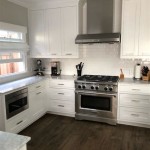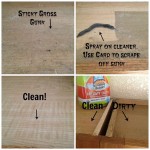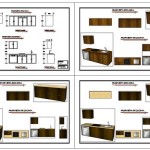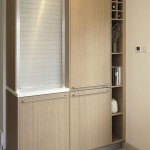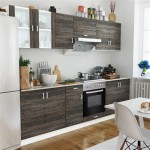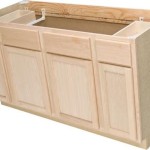How to Spray Paint Kitchen Cabinets White: A Comprehensive Guide
Transforming your kitchen cabinets with a fresh coat of white paint can significantly enhance their aesthetic appeal and revitalize the entire space. While spray painting is a convenient and efficient method, achieving a professional-looking finish requires meticulous preparation and execution. This guide will provide you with comprehensive instructions, essential tips, and expert advice to ensure a successful cabinet makeover.
Before You Start: Essential Materials and Tools
Gather the following materials for a seamless spray painting experience:
- White cabinet paint (choose a paint specifically designed for kitchen cabinets)
- Primer (optional but recommended for a durable finish)
- Sprayer (HVLP or airless preferred)
- Sandpaper (120-grit and 220-grit)
- Tack cloths
- Clean rags or microfiber cloths
- Painter's tape
- Plastic drop cloths or tarps
- Safety glasses or goggles
- Respirator or face mask
- Screwdriver or drill (for removing hardware)
Step 1: Preparation and Disassembly
Thoroughly clean the cabinets with a grease-cutting cleaner. Remove all hardware, including knobs, handles, and hinges. If possible, dismantle the cabinet doors and drawers for easier spraying. Use painter's tape to protect any areas you don't want to paint.
Step 2: Sanding and Priming
Sand the cabinet surfaces lightly with 120-grit sandpaper to remove any old finish or imperfections. Wipe away any dust with a tack cloth. If desired, apply a thin coat of primer specifically designed for kitchen cabinets. Allow the primer to dry completely before proceeding.
Step 3: Setting Up the Sprayer
Follow the manufacturer's instructions to properly set up and adjust your sprayer. Test the sprayer on a piece of cardboard to ensure the correct paint flow and coverage.
Step 4: Spraying the Cabinets
Wear protective gear, including safety glasses and a respirator. Spray light, even coats onto the cabinets. Hold the sprayer 6-8 inches away from the surface and move it back and forth in smooth strokes. Allow each coat to dry thoroughly before applying subsequent coats.
Step 5: Sanding and Finishing
Once the paint is completely dry, lightly sand the surface with 220-grit sandpaper to smooth out any imperfections or drips. Wipe away any dust and apply a second coat of paint if necessary. Allow the final coat to dry and cure according to the manufacturer's instructions.
Step 6: Reassembly and Hardware Installation
Reattach all hardware and reassemble the cabinets. Check for any touch-ups or minor imperfections and address them as needed. Allow the cabinets to fully cure before exposing them to heavy use.
Expert Tips for a Flawless Finish
- Use a high-quality paint and sprayer to achieve a professional-looking result.
- Practice on a scrap piece of wood or cardboard before spraying the actual cabinets.
- Apply multiple thin coats rather than a single thick coat to avoid drips or runs.
- Allow ample drying time between coats to ensure proper adhesion and durability.
- Protect surrounding surfaces with plastic drop cloths or tarps to prevent overspray.
- Clean your sprayer thoroughly after each use to maintain its performance.

What Is The Best Spray Paint On Kitchen Cabinets

Kitchen Spray Painting The Facelift Company

Spray Painting Kitchen Cabinets Pictures Ideas From

Here S How To Spray Paint Kitchen Cabinets Old New Before And After

How To Paint Kitchen Cabinets With A Sprayer Thrifty Decor Diy And Organizing

How To Spray Paint Kitchen Cupboards And Achieve A Professional Finish Easy Diy Tips Express Co

How To Paint Kitchen Cabinets With A Sprayer

How To Spray Paint Kitchen Units Pintyplus

Painting Kitchen Cabinets White Beneath My Heart

Spray Painting Kitchen Cabinets Refurbished Makeover
Related Posts

